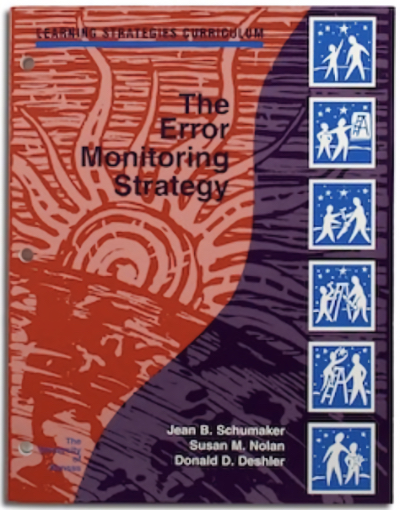Error Monitoring Strategy

The Error Monitoring Strategy can be used by students to independently detect and correct errors in their hand written work to increase the overall quality of their final product. Instruction stresses the importance of proof-reading written work for content and mechanical errors and eliminating those errors before work is submitted. This strategy also includes the development of personal strategies to avoid future errors. Research results demonstrated that students who mastered this strategy dramatically increased their ability to find and correct errors in their written products. Before instruction, they were making one error in every four words. After instruction, they made only one error in every 20 words.
SIM Mnemonic Learning Devices created for this strategy (1985):
COPS - used to help students edit their hand writing by checking for key elements
Other SIM Mnemonic Learning Devices used with this strategy:
PENS - used to improve sentence writing (1998)
Author(s):Jean B. Schumaker, Susan M. Nolan, and Donald D. Deshler
Publication and Purchasing Information: University of Kansas, Center for Research on Learning / KU CRL Online Store
RESOURCES:
RESEARCH ARTICLES:
- Shannon, T. R., & Polloway, E. A. (1993). Promoting error monitoring in middle school students with LD. Intervention in School and Clinic, 28(3), 160- https://doi.org/10.1177/105345129302800307
- Schumaker, J.B., Deshler, D.D., Alley, G.R., Warner, M.M., Clark, F.L., & Nolan, S. (1982) Error monitoring: A learning strategy for improving adolescent academic performance. In W. M. Cruickshank & J.W. Lerner (Eds.), Coming of Age: Selected papers from the 18th international conference of the Association for Children and Adults with Learning Disabilities, Vol. 3 (pp. 170-183). Syracuse, NY: Syracuse University Press. Three replications of a multiple-baseline design across students is employed to determine the effect of teaching adolescents with LD the Error Monitoring Strategy.
The Story Behind the Error Monitoring Strategy from author Jean B. Schumaker, Ph.D.
I started developing instructional programs for writing skills in the 1970s when I was a graduate student at the University of Kansas. My graduate program required me to take part in an internship at the probation department of the Douglas County Juvenile Court in Kansas. I was assigned several cases of truant secondary students. In working with these students, I learned that they could not write. They told me that one of the reasons they avoided school was that they were embarrassed because they could not complete the work assigned to them. I also learned that there were no instructional programs available to teach them writing in an intensive way. I embarked on a journey of developing writing programs that continues to this day.
The Error Monitoring Strategy program was one of the first programs that our research team developed in the early years of the Institute for Research on Learning Disabilities. We learned very quickly that secondary students with learning disabilities were making about one error in every three written words in their paragraphs and essays. Their peers without disabilities were making about one error in every thirty written words. Since our charge was to develop instructional programs that would quickly improve students’ writing skills such that they could succeed in their required secondary courses, we designed this strategy based on data that Don Deshler had gathered as a graduate student. Our goal was to enable students to check their own work for errors and then correct the errors that they found. The types of errors that they search for and correct in their writing are in four categories: capitalization errors, overall appearance errors, punctuation errors, and spelling errors.
Author's Thoughts about Strategic Instruction
Strategic instruction is one of the few instructional methods that have been shown to be effective through empirical research to produce improvement in learning and in the academic performance of at-risk students. The studies conducted on the Error Monitoring Strategy Program have shown that a variety of students, including students with and without disabilities can learn to find and correct errors in their own and others’ writing when this program is used with fidelity. Moreover, the error rate of students with learning disabilities after they reach mastery is comparable to the error rate of normally achieving students. If students need prerequisite instruction in capitalization and punctuation rules, they can learn these rules through the Capitalization, Commas, and Punctuation Strategies CD programs.
Teacher and Student Feedback on the Error Monitoring Strategy
Teachers have taught this strategy in a variety of settings including general education English and language arts classes, resource rooms, tutoring settings, and after-school programs. Teachers have reported that their students’ writing improves dramatically after they learn how to cue in on the types of errors that they can make. This program is included in numerous district scope and sequence documents across the nation starting at the fifth and sixth grades.
This product is available through the KUCRL Shop.
Please note that professional development, coaching, and infrastructure support are essential components to effective implementation of SIM instructional tools and interventions. It is highly recommended that you work with a SIM professional developer. See the SIM Event list for sessions or email simpd@ku.edu to learn more.
An accessible version of the documents on this site will be made available upon request. Please contact the KU CRL Professional Development Research Institute, at simpd@ku.edu to request the document be made available in an accessible format.